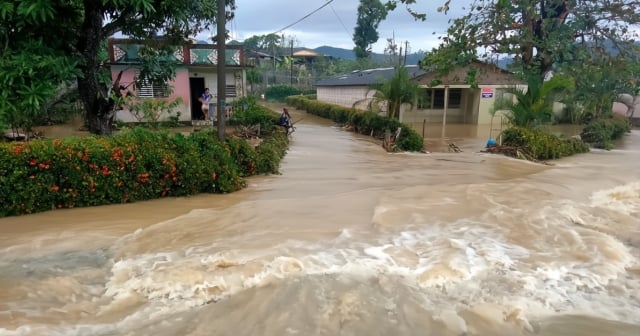The devastation left by Hurricane Oscar in Guantánamo is not only measured in destroyed houses and disconnected families but also in the feeling of abandonment that has overwhelmed the survivors, who claim that the Cuban government left them to fend for themselves during the most critical moments.
In San Antonio del Sur, one of the hardest-hit municipalities, a local resident had the opportunity to confront Miguel Díaz-Canel face to face when he appeared three days after the disaster. "They left us alone there with 29 children," the man exclaimed, recounting how authorities promised rescue equipment that never arrived. The affected had no choice but to fend for themselves, and together with neighbors, they managed to evacuate those they could, facing the overflowing river. The distress was palpable: "We almost drowned," the man confessed, while Díaz-Canel attempted to justify the situation with excuses that sounded like empty promises.
This feeling of abandonment is not exclusive to San Antonio. In municipalities like Imías, entire families were trapped in their homes, watching as the water rose to the roof. "The water keeps rising and help hasn't arrived," they said desperately in videos circulating on social media, where submerged houses and neighbors perched on rooftops hoping for rescue can be seen. But days went by, and the only real support came from neighbors helping neighbors, as the authorities were noticeably absent. The hardest part for many was seeing how the official figures did not reflect what truly happened. The government announced the death of seven people in Guantánamo, but local residents insist that the reality is much grimmer. "Here, there are between 17 and 20 dead. They don't say it, but in the towns, everyone knows each other," claimed a resident of San Antonio del Sur. Authorities attempted to downplay the tragedy, but the missing are counted by the dozens and the deceased are not fully accounted for.
And if the situation weren't already sufficiently desperate, the lack of information exacerbates the chaos. The blackout that left Cuba in darkness days before the hurricane prevented many from realizing the magnitude of what was coming. Families trapped in their homes did not receive alerts and had no time to evacuate. The result: lost lives and a pain that still resonates in the submerged streets of these municipalities.
The people of Guantánamo, accustomed to facing crises, have turned to social media in an attempt to locate their loved ones. Parents, siblings, and friends are seeking news about their family members, hoping that the connectivity, which is currently so limited, will provide them with some relief.
Although the rescue brigades, led by the Armed Forces and the Ministry of the Interior, have begun to arrive, for many it is already too late. Those who have survived are not only fighting against the destruction of their homes but also against the neglect into which they have been cast by a government that seems more interested in justifying its mistakes than in addressing the urgent needs of its people.
Guantánamo continues to wait. The government's promises sound empty, and the feeling of abandonment runs as deep as the waters that still cover much of the region.
What do you think?
COMMENTFiled under:
